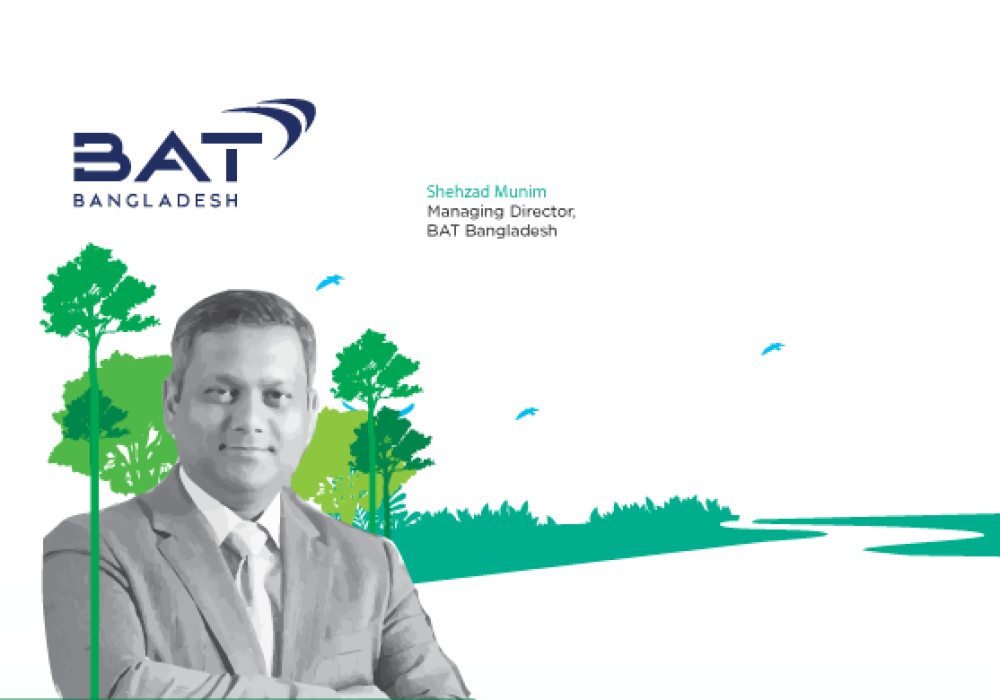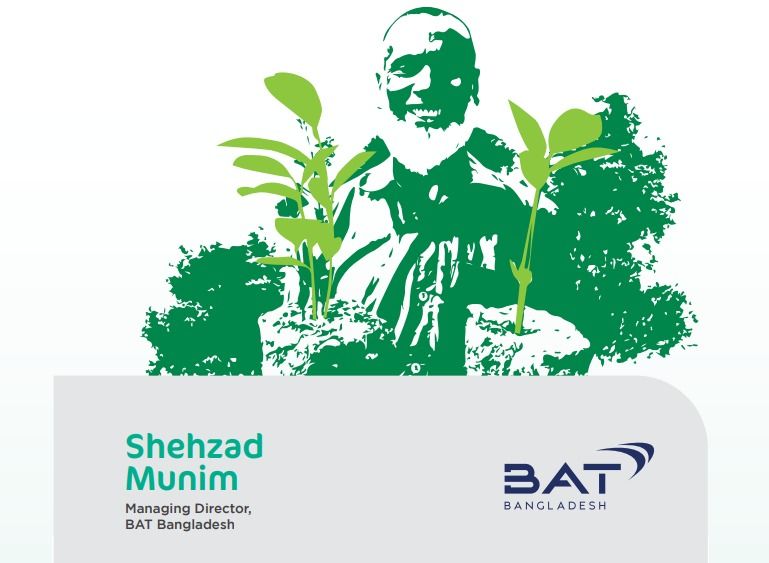![]() Mr. Shehzad Munim
Mr. Shehzad Munim
![]() August 24, 2023
August 24, 2023
![]() (0) Comment
(0) Comment

![]() Mr. Shehzad Munim
Mr. Shehzad Munim
![]() August 24, 2023
August 24, 2023
![]() (0) Comment
(0) Comment
 Even a few decades back, corporate sustainability was a concept hardly considered relevant by businesses. But with the challenges posed by climate change becoming more complex and dynamic by the day, for businesses to remain competitive and sustain in the long run, embracing sustainability has become critical. As a result, businesses now are becoming more aware about the importance of adopting sustainable practices in every layer of operation, from investing in green technologies and innovations to creating shared values for the communities, stakeholders and shareholders. The Bangladeshi business landscape is also treading on the same path. Take the case of the garment industry for example: there are now more than 150 green garment buildings in the country; 44 of them acknowledged with the prestigious platinum rating. Four of these buildings have also been recognised by the United States Green Building Council (USGBC) for Leadership in Environmental and Energy in Design (LEED). The nation is now considered a global leader.
Even a few decades back, corporate sustainability was a concept hardly considered relevant by businesses. But with the challenges posed by climate change becoming more complex and dynamic by the day, for businesses to remain competitive and sustain in the long run, embracing sustainability has become critical. As a result, businesses now are becoming more aware about the importance of adopting sustainable practices in every layer of operation, from investing in green technologies and innovations to creating shared values for the communities, stakeholders and shareholders. The Bangladeshi business landscape is also treading on the same path. Take the case of the garment industry for example: there are now more than 150 green garment buildings in the country; 44 of them acknowledged with the prestigious platinum rating. Four of these buildings have also been recognised by the United States Green Building Council (USGBC) for Leadership in Environmental and Energy in Design (LEED). The nation is now considered a global leader.

In december last year, the government recognized and awarded 30 companies from six industries with the green factory award—a first for the nation. almost all of these are local companies. This initiative by the government reflects the degree of importance it attaches to sustainable business practices in bangladesh.
 The multinational companies operating in the country are also doing their part in making their businesses sustainable. BAT Bangladesh, for example, is working proactively in promoting the concept of ESG across multiple platforms, including in business forums and policy-related discussion sessions. And with the aim to ensure transparency in business practices and to inspire others to do the same, BAT Bangladesh launched its first-ever Environmental, Social, and Governance (ESG) Report earlier this year. As an organization, it has taken remarkable initiatives that have not only helped restore the environment but have also improved beneficiary livelihoods in the broader society. The dedication to society is evident through our flagship ESG initiatives, which include the country’s largest afforestation program, a safe drinking water project, and an off-grid renewable energy initiative. BAT Bangladesh is proudly leading several environmental efforts, including sound farming practices, steps to reduce carbon emissions, and reduction of unnecessary single-use plastics, among other initiatives. By 2030, the company aims to reach carbon neutrality (phase 1 & 2) by lowering energy use, utilizing renewable energy sources, and minimizing manufacturing waste disposal.
The multinational companies operating in the country are also doing their part in making their businesses sustainable. BAT Bangladesh, for example, is working proactively in promoting the concept of ESG across multiple platforms, including in business forums and policy-related discussion sessions. And with the aim to ensure transparency in business practices and to inspire others to do the same, BAT Bangladesh launched its first-ever Environmental, Social, and Governance (ESG) Report earlier this year. As an organization, it has taken remarkable initiatives that have not only helped restore the environment but have also improved beneficiary livelihoods in the broader society. The dedication to society is evident through our flagship ESG initiatives, which include the country’s largest afforestation program, a safe drinking water project, and an off-grid renewable energy initiative. BAT Bangladesh is proudly leading several environmental efforts, including sound farming practices, steps to reduce carbon emissions, and reduction of unnecessary single-use plastics, among other initiatives. By 2030, the company aims to reach carbon neutrality (phase 1 & 2) by lowering energy use, utilizing renewable energy sources, and minimizing manufacturing waste disposal.
As BAT Bangladesh made the transition from CSR to ESG, one thing that became evident was the fact that ESG is something which cannot be driven alone. It requires extensive collaboration between multiple functions and stakeholders—including in the corporate and regulatory spaces—to work towards achieving the common goal. Similarly, when it comes to supporting the Government and working towards achieving the SDGs, renowned private sector companies can play leading roles in driving important agendas. As we understand, Unilever Bangladesh is investing heavily in promoting a circular economy, with a special focus on plastic management. Hence, they can lead the journey whereas the others can follow suit. Similarly, BAT Bangladesh has led the private sector afforestation movement for over 40 years now and can inspire others to join the cause and make their contributions.
On a similar tangent, renowned banks like Standard Chartered Bangladesh, HSBC and City Bank Ltd., who are focusing on the green financing journey can lead the way for others to follow. For instance, SCB launched the country’s first ever green bond last year for Pran Agro Ltd, a concern of Pran-RFL Group; and City Bank Ltd. was awarded by Bangladesh Bank as the top bank in “Sustainability Rating” for the last two years.
These are very positive developments for us; examples that will inspire others to follow suit. But then there are challenges to adopting sustainable practices in business. The ongoing global pandemic and the economic repercussions of a war at the heart of Europe have exacerbated challenges for businesses in staying afloat and in such a scenario—with a focus on sustaining operations—sustainability often fails to make it to the top of the priority list. Moreover, small businesses often lack the resources who can understand and drive sustainability within their culture and ecosystem. In addition, many businesses still fail to see the long-term gains that sustainable business practices can yield and are overwhelmed by the immediate costs.
To overcome these issues, it is important for companies to change their perspective towards sustainability. It should be seen as a tool for resource optimisation, enhanced business performance and long-term benefits. A research by Deutsche Bank—focused on the evaluation of 56 academic studies—suggest that companies that have a high rating for ESG have comparatively lower cost of debt and equity. 89 percent of the 56 academic studies that had been evaluated for the research indicate that companies with a high rating for ESG outperform the market in the medium to long-term.Companies should be made aware of these studies and research findings, and relevant case studies should also be made easily available for them, so that they can see the benefits of investing in sustainable business innovations.
Sustainably, in principle and in practice, should be placed at the heart of any corporate, because only by adopting sustainable business practices can they survive in the long term. Sustainability is no longer a luxury—as seen in the past— rather it has become a pressing necessity. If businesses do not equip themselves with innovative sustainable solutions today, tomorrow they will be forced to bear the brunt of it—be it in the form of costly raw material sourcing or having to operate in a non-conducive environment.
It is high time for businesses to focus on decarbonisation, introduce CO2 neutrality in the extended value chain, completely switch to renewable sources of energy, adopt circular economic practices, invest in R&D with a special focus on innovative sustainable solutions, create values for the communities, and most importantly, have a clear, target-based strategy to implement the above.
The government in Bangladesh, on its part, is encouraging businesses to adopt sustainable practices, and the central bank is also encouraging green investments. Now it is up to us—the big business— to take the lead in creating long-term values for both shareholders and stakeholders, and set examples for others.
However, the bigger aim of implementing a sustainable business model across industries, will not be possible without effective collaborations at every level. This is a journey that policymakers, regulators, corporates, development sector, and civil society must embark upon together. We need to have a shared vision and work as a team to realize it. The question remains, do we have the intent? Our future actions will tell.


Shehzad Munim joined BAT Bangladesh as a Territory Officer in 1997, immediately after graduating from the Institute of Business Administration (IBA), University of Dhaka. He has worked in various marketing roles within BAT Bangladesh before taking up assignments in BAT New Zealand as Group Brand Manager in 2003 and subsequently, taking over the role of Head of Brand Marketing in 2005. In 2006, he was engaged as a manager in product and packaging innovation in Sydney, Australia. Afterwards, he returned to Bangladesh as Head of Brand and was appointed as Head of Marketing. In 2010, he took over the role of Area Head of Marketing for South Asia. In 2010 he was also appointed to BAT Bangladesh’s Board of Directors. Thereafter, he was appointed as the first ever Bangladeshi Managing Director of BAT Bangladesh in 2013. Within a short period, he has contributed immensely to elevate the organization to its next level, ensuring sustainable shareholder and stakeholder value creation, while also enhancing the company’s contribution to economic development to achieve the SDG goals, aligned with the vision of the Government.
Munim is currently the treasurer of British Business Group Board of Trustees. He is also the former President of Foreign Investors Chambers of Commerce & Industries (FICCI).